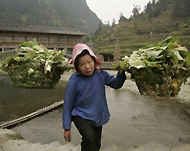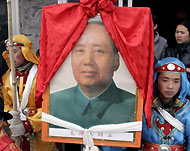Mao ‘the protector of the poor’
As a heroine of the guerrilla movement, she was decorated for blowing up a Japanese machine gun nest with two grenades.

Now 78, and too frightened to give a journalist her full name, Mrs Wang is about to be thrown out of her one-room home in a village near Beijing, a victim of the corrupt officialdom rife in modern China.
The rectangular room smells musty and mould creeps up the cracked plaster on the walls. But between the rickety wardrobe and the threadbare curtains is a large brightly coloured poster that, to a casual glance, might depict a religious icon.
Standing in the white clouds before a radiant sun, Chairman Mao looks down with a paternal smile on happy peasants working the fertile land.
For Wang, Mao is the father of modern China.
|
“There were no beggars in Mao’s time” Mrs Wang |
“I remember Chairman Mao looked after the poor,” she says. “Before liberation we couldn’t find food, but afterwards Mao made sure the poor people could eat. There were no beggars in Mao’s time.”
Today, Wang is waiting to be evicted. All land in China is owned by the government, but regional authorities have sold local leases illegally to property developers.
Social safety net
 |
|
Millions of Chinese peasants |
The land around Baixin village is being swallowed up to build upmarket villas, and the house in which Wang has lived all of her life is to be demolished. She has not received a penny in compensation.
Such things would never have happened under ‘The Great Helmsman’, she says.
According to Professor Joseph Cheng, of City University in Hong Kong, it was exactly that appeal that swept Mao to power in 1949.
Empowering the masses, redistributing the land and providing a social safety net that would meet the basic needs of all was an attractive option in the aftermath of occupation and civil war.
Political intrigues
“People think of him like grandfather or uncle who we all know had some vices, but is remembered as a dear old man who did his best for the family,” he says.
|
“People think of him like grandfather or uncle” |
However, Cheng is sceptical about Mao’s real legacy in modern China.
“He will be remembered as a great leader, but like many first-generation leaders he did not manage to bring about the modernisation of the country,” he says. “Today the objectives of the leadership, the people and the party have changed.”
The failure to modernise was due partly to Mao’s political style after he came to power.
Known to be a fan of the political intrigues of classical Chinese literature, Mao showed all the instincts of a schemer in his early purges of perceived enemies in the party and in the wider population.
Greatest legacy
 |
|
Mao remains a revered icon in |
Intellectuals, technical experts and academics soon learnt that having a high profile was dangerous in communist China.
When it came to the huge modernisation programmes that Mao proposed, such as the Great Leap Forward, the talent was no longer available.
But it is the Cultural Revolution that remains rooted in people’s memories as Mao’s greatest legacy.
Between 1966 and 1976, schools and universities were closed, intellectuals were denounced and millions were sent to the countryside for “re-education”.
Red Guards, Mao’s personal ideological army, were sent into factories, farms and even their own homes to weed out “decadent” thinking, waving little red books containing Maoist thoughts and slogans.
Ducking the issue
A generation of Chinese grew up with no formal education in an era that ended only with Mao’s death.
 |
|
China’s current leaders pin their |
Dai Qing, a dissident journalist, was one of those sent to the countryside for “education through labour”. However, she thinks that the tendency to dismiss the period as one of Mao’s greatest mistakes ducks the real issue.
“Mao wasn’t always monster,” she says. “All of his comrades, all of the Chinese people should take responsibility for what happened then. We supported him and didn’t speak up when he became too powerful.”
One man who did dare to propose change was Deng Xiaoping, who initiated China‘s “open policy” that followed the Cultural Revolution, and who has arguably shaped modern China far more than Mao.
Abandoned
Under the label “socialism with Chinese characteristics”, Deng introduced market reforms and capitalist policies that enabled China‘s current economic boom.
But that boom has not benefited many of China‘s estimated 700 million peasants, whose land has been taken for factories and housing, while the price of their agricultural produce has dropped in the face of global imports.
China‘s current leaders pay lip service to Mao’s legacy. They are also nervous – aware that those who remember him most fondly do so because they feel abandoned by the politicians now in his place.